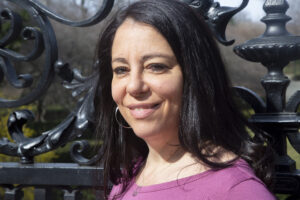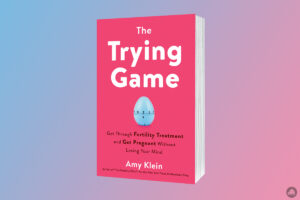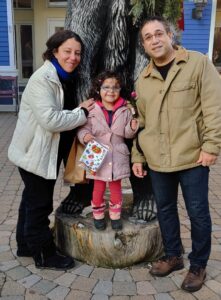Meet Later in Life Mother Amy Klein: Interview by Robin Gorman Newman

Amy Klein headshots in Central Park on March 8, 2020
AGE: 48
RELATIONSHIP STATUS: Married
RESIDENCE: NYC
I’m a journalist who writes about health and later, fertility. I had New York Times column following my journey through fertility and now a book, The Trying Game: Get Through Fertility Treatment and Get Pregnant Without Losing Your Mind (Penguin/Random House) that helps others through the journey. prh.com/tryinggame Find me on: Instagram Twitter Facebook
Tell us about your path to parenthood. Even though I was 41 when I got married, I thought it wouldn’t be difficult to get pregnant. And it wasn’t. For me it was impossible to stay pregnant. After two miscarriages, I started IVF and after another two miscarriages (one with a donor egg), I finally found a reproductive immunologist to help me carry a baby. Ten doctors, four years, three countries later we had our daughter….now age 4.5.
How does motherhood influence your work? Well, my work is writing, so it’s often about parenting, or what I sometimes call pre-parenting, ie Trying (coincidentally the title of my book). Before I had a kid, I promised I would never complain about it, like I’m so glad it’s Monday, away from the family, but that promise is impossible to keep. I’m grateful for my family, but can’t believe the headspace and emotional labor it all takes up – and threatens to take over my writing. Thankfully, I write about all of it so it’s intertwined.
What inspired you to chronicle your fertility journey in The New York Times? When I started Trying in 2011, there wasn’t really anything in the mainstream space. There were these secret boards called “fertile thoughts” where everyone was wishing each other “magic
 baby dust” and scientific journals but nothing in the mainstream media. I kept on sending the Times essays and pitches and she just offered me a column – which she thought would quickly transition into a pregnancy column. HA! Thirty columns and three years later…
baby dust” and scientific journals but nothing in the mainstream media. I kept on sending the Times essays and pitches and she just offered me a column – which she thought would quickly transition into a pregnancy column. HA! Thirty columns and three years later…
What inspired you to write your book? I always thought I’d write a memoir of my journey, but after I wrote most of it, I realized that people going through infertility really need more than my personal story. Whether you’re young and just starting out, freezing your eggs, going it alone, with a same-sex partner, or in the trenches for a while, you want support and to figure out how the F to do this. These days all the fertility boards have migrated to Facebook, and there’s too much rather than too little information. But the questions are the same: Do I need to go to my best friend’s baby shower? How many embryos should I transfer? How am I going to pay for all of this?
I wanted to help people not make the same mistakes I made, and get through it all faster and emerge saner.
What advice would you offer multi-tasking later in life moms? Well, most of us have an advantage, the wisdom that comes with age. Not everything is as important, we realize, and for me at least, I never got so swallowed up by motherhood that I forgot who I was. I mean, I’m a writer and a journalist, even if I took time off for pregnancy and parenting. I don’t know if I would have said that if I’d started earlier. In my book, I have a chapter on regrets – I would’ve/should’ve/could’ve started younger, earlier,– but what we really find, if given the same set of circumstances, is we would make the same choices all over again. So NO REGRETS. As a later mom, maybe we have more of a responsibility to be healthier both in body AND mind, to be conscious and loving parents.
Is it tough to balance parenting, a personal life and professional pursuits? I think it’s true you might be able to have it all but not all at the same time. When I used to be more active at the gym, in my thirties, I remember that some days, when I was anxious and stressed and worried, well, those were cardio days. Other days, when I was low and tired and bummed out would be weights day. In the former I hadn’t the concentration, in the latter I hadn’t the energy. Metaphorically, it just means to go with where ever you are. In hindsight, I wish I had taken off the first six months after birth and then went back to work full-time instead of doing a mediocre job trying to work those early months.
I’m a notorious extrovert, so sometimes it’s hard for me to turn inward and focus only on family and/or writing. Luckily, my daughter has FOMO too, so we make an excellent team out in the world.
How do practice self-care and de-stress? I love to work out (see above). A swimming injury has stopped me from the pool and yoga so I switch it up to spinning and running. I spend way too much time online and way too much time noshing when I shouldn’t be, but I’ve learned to forgive myself these foibles.
 What are the positives and challenges of becoming a later in life mother? I was raised in a religious community that expected me to start having children by 25 – and only have a flexible, unserious career to support that – but part of me knew that would have destroyed me. I can’t speak for everyone, but I know if I had started younger – at 25, 30 or even 35, I don’t think I would have survived. I think I would have lost my identity and any shots for a career – and a lasting marriage.
What are the positives and challenges of becoming a later in life mother? I was raised in a religious community that expected me to start having children by 25 – and only have a flexible, unserious career to support that – but part of me knew that would have destroyed me. I can’t speak for everyone, but I know if I had started younger – at 25, 30 or even 35, I don’t think I would have survived. I think I would have lost my identity and any shots for a career – and a lasting marriage.
While I wish I had that baby at 41 (and not lost all my lost pregnancies), I think I’m a much calmer, happier and involved mom than I would have been the decade prior.
What do you most want to teach your daughter? I want to teach her joy and perseverance.
What words of wisdom would you share with someone contemplating later in life motherhood? Go for it! 35 sounds young to me, and even 40 does. According to national fertility statistics, the only age of fertility rate increases are in the over 40 range (especially over 44, usually with donor eggs). I’m lucky enough to be in NYC where all my friends had babies later, so I would just say to make sure you find your people. You don’t want to be the only 40-year-old mom in a community of 25 year olds (or maybe you do!). Just ask yourself can I do this? And if the answer is yes, then go for it!
Tags: amy klein, having a baby, having a child over 40, infertility, jewish mom, later in life mom, later in life mother, motherhood, ny times, parenting later in life, pregnancy, raising a daughter, the trying game















